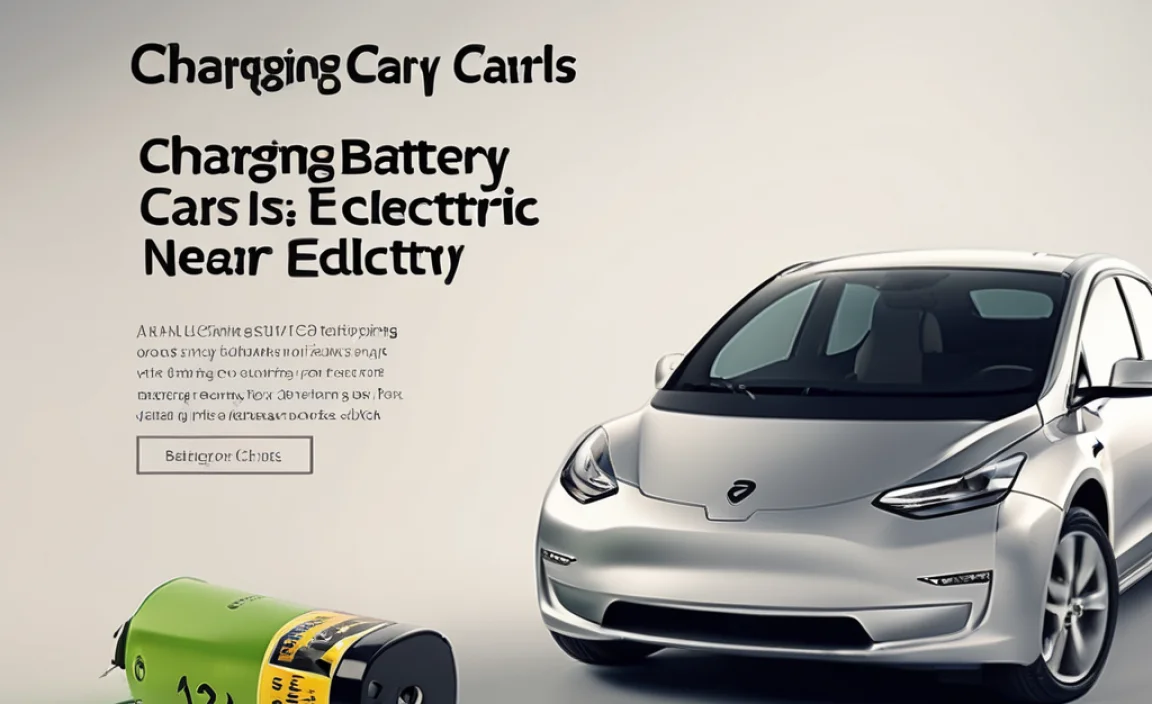Upgrading your Nissan Leaf’s battery is crucial for extending range and performance. This guide provides easy steps to understand your options, choose the right upgrade, and ensure a smooth transition for essential power in your EV.
Battery Upgrade For Nissan Leaf: Essential Power
Is your Nissan Leaf’s battery starting to feel a little tired? You know, that feeling when the range just doesn’t go as far as it used to, or maybe you’re just dreaming of taking on longer road trips without constant charging worries? It’s a common story for electric vehicle owners. But don’t worry, upgrading the battery in your Nissan Leaf is more achievable than you might think. It’s your key to unlocking more miles and more freedom. We’re going to walk through everything you need to know, step by step, making it feel simple and completely doable. Get ready to give your Leaf a new lease on life and power up your adventures!
Understanding Your Nissan Leaf Battery
Your Nissan Leaf, like all electric cars, runs on a big rechargeable battery. Think of it as the car’s fuel tank, but instead of gasoline, it stores electricity. Over time and with many uses, these batteries can lose some of their ability to hold a full charge. This means your car might not be able to travel as far on a single charge as it did when it was new. This is called battery degradation.
The original Nissan Leaf batteries were offered in various sizes, often measured in kilowatt-hours (kWh). A higher kWh number means a bigger battery and, generally, more range. For example, early Leafs might have had battery packs around 24 kWh, offering a certain range, while newer models offer much larger packs, like 40 kWh or 62 kWh.
Why Upgrade or Replace?
There are a few main reasons why you might consider a battery upgrade or replacement for your Nissan Leaf:
- Increased Range: The most common reason. A larger or healthier battery means you can drive further on a single charge. This is fantastic for daily commutes, errands, and even longer journeys.
- Restored Performance: As batteries age, they can sometimes affect the car’s overall performance. A new or upgraded battery can bring back that responsive feeling.
- Extended Vehicle Lifespan: An electric car’s battery is its most expensive component. Replacing or upgrading it can ensure your Leaf remains a reliable vehicle for many more years.
- Technological Advancements: Newer battery technology might offer better efficiency, faster charging, or improved durability compared to older models.
Types of Battery Upgrades for Your Nissan Leaf
When we talk about a “battery upgrade” for a Nissan Leaf, it can mean a couple of different things. It’s important to understand these to know what’s best for you.
1. Battery Health Restoration (Module Replacement/Repair)
Often, a Nissan Leaf’s battery doesn’t fail completely, but certain individual battery modules within the main pack start to degrade faster than others. This causes the overall capacity (and therefore range) to drop. In many cases, it’s possible to replace these specific weaker modules with healthy ones.
How it works: Specialists can diagnose which modules are underperforming. They then source compatible used or refurbished modules to replace the faulty ones. This can restore a significant portion of the original range without replacing the entire, very expensive, battery pack.
Pros:
- More affordable than a full battery replacement.
- Can significantly improve range and performance.
- Eco-friendly as it reuses battery components.
Cons:
- Relies on the availability and quality of donor modules.
- The lifespan of replaced modules might vary.
- Requires specialized knowledge and equipment to perform safely.
2. Full Battery Pack Replacement
This is the most straightforward but also the most expensive option. It involves replacing the entire original battery pack with a new or remanufactured one. This could be an equivalent capacity pack to your original, or potentially a higher capacity one if available and compatible.
How it works: The old battery pack is removed, and a new one is installed. This is a complex procedure typically done by authorized service centers or reputable EV specialists.
Pros:
- Completely restores the battery to new or better-than-new condition.
- Often comes with a warranty.
- Guaranteed compatibility and performance.
Cons:
- Highest cost.
- Requires finding a source for a new or compatible remanufactured pack.
3. Higher Capacity Battery Pack Upgrade (Less Common for Nissan Leaf DIY)
For some EV models, there are aftermarket kits or options to install a battery pack with a higher capacity than the original. This offers the maximum possible range increase. However, for the Nissan Leaf, this is significantly more complex and less common, often requiring custom engineering and is usually not a simple DIY job.
How it works: This involves sourcing and physically fitting a larger battery pack, often requiring modifications to the car’s structure, cooling systems, and the vehicle’s Battery Management System (BMS) to communicate with the new pack.
Pros:
- Maximum possible range extension.
Cons:
- Extremely expensive and complex.
- May void warranties.
- Requires extensive professional modification.
- Not widely available for the Nissan Leaf compared to some other EVs.
Choosing the Right Upgrade Path
So, which path is right for you? Here’s a breakdown to help you decide:
When to Consider Module Replacement/Repair:
- Your Leaf is still otherwise in good condition and you want to keep it running reliably.
- You want a significant range boost but at a more manageable cost.
- You’re comfortable with or can find a specialist who can handle the repair.
- Your car is out of its original battery warranty.
When to Consider Full Battery Pack Replacement:
- You want the peace of mind of a brand-new, factory-spec battery.
- Budget is less of a concern, and you want the most straightforward solution.
- Your current battery is severely degraded or has failed.
- You plan to keep the car for many more years and want maximum longevity.
Important Note: For most Nissan Leaf owners, especially those looking for a practical solution without breaking the bank, the module repair/replacement is often the most appealing and achievable “upgrade.” Full replacement is the most reliable but also the most costly. Higher capacity upgrades are generally not practical or widely available for the Leaf.
Understanding Your Nissan Leaf’s Battery Management System (BMS)
Your car’s Battery Management System (BMS) is like the “brain” of the battery pack. It’s a sophisticated electronic system that monitors and controls the battery’s charging and discharging. It’s crucial for safety and performance. The BMS:
- Monitors the voltage and temperature of individual cells and modules.
- Balances the charge across all cells to ensure they wear evenly.
- Protects the battery from overcharging, over-discharging, and overheating.
- Communicates battery status to the car’s dashboard and other systems.
When you undertake any battery work, especially module replacement, ensuring the BMS can correctly recognize and manage the new or repaired modules is paramount. This is why specialized knowledge is so important. Sometimes, older Leaf models might receive software updates that enable them to better utilize their existing capacity, which is different from a hardware upgrade but can feel like a small boost.
Finding a Specialist for Your Nissan Leaf Battery Upgrade
This is not a typical DIY job for the average car owner. Working with high-voltage EV batteries carries significant risks, including electric shock and fire. It requires specialized tools, training, and safety equipment.
Here’s where to look for help:
- Nissan Dealerships: They are the most official route for battery replacements. They will always offer new packs, which are the most expensive option.
- Independent EV Specialists: Many independent garages now specialize in electric vehicles. They might offer both new pack replacements and, more importantly, battery module repair or refurbishment services. It’s worth searching for EV repair shops in your area.
- Dedicated Battery Repair Companies: A growing number of companies focus specifically on repairing and refurbishing EV battery packs. These can be nationwide services where you might ship your battery or regional businesses that work directly on the car.
When choosing a specialist, ask them:
- What types of battery upgrades or repairs do they offer for the Nissan Leaf?
- What is their experience with Nissan Leaf batteries specifically?
- Do they offer a warranty on their work and any parts used?
- What is the estimated cost and turnaround time?
- What kind of performance improvement can I expect?
The Process: What to Expect During an Upgrade/Repair
While the exact steps vary between repair shops and the type of upgrade, here’s a general idea of what happens when you get your Nissan Leaf battery serviced for range improvement:
Stage 1: Assessment and Diagnosis
The specialist will first assess your current battery’s health. This usually involves:
- Connecting diagnostic tools to read the BMS data.
- Performing health tests to measure actual capacity and module performance.
- Physically inspecting the battery pack for any visible issues.
- Discussing your current range and expectations to recommend the best course of action (module repair vs. full replacement).
Stage 2: Battery Pack Removal
This is a critical safety step. The vehicle is powered down, and high-voltage systems are disconnected. The battery pack, which is typically located under the floor of the car, is carefully removed using specialized lifts and tools. It’s a heavy component.
Stage 3: Battery Repair or Replacement
This is where the actual “upgrade” happens:
-
For Module Repair: The battery pack is opened. Technicians identify and remove the degraded modules. They then install healthy replacement modules (new, refurbished, or from a donor pack). Careful reassembly and sealing of the pack follow.
-
For Full Replacement: The old pack is set aside, and a new or remanufactured pack is prepared for installation.
Stage 4: Reinstallation and Reintegration
The serviced or new battery pack is carefully reinstalled into the Nissan Leaf.
Stage 5: System Testing and Calibration
Once the pack is back in place, the high-voltage system is reconnected. The BMS will be checked to ensure it’s communicating correctly with the battery. Software may need to be updated or parameters recalibrated to recognize the new configuration or restored capacity. The car will undergo a series of tests to confirm everything is working as expected, including checking for error codes and verifying range estimates.
Stage 6: Handover and Warranty
You’ll receive your Leaf back, along with information on the work done, any new warranties provided, and advice on how to get the most out of your revitalized battery.
Cost of Nissan Leaf Battery Upgrades
The cost is a major factor for most people. It’s important to understand that EV battery work is still a significant investment, but repairing and refurbishing is often much cheaper than full replacement.
Here’s a general idea:
- Module Repair/Refurbishment: This can range from around $1,500 to $5,000 USD, depending on the number of modules needed and the specialist’s labor rates. This often brings back 70-90% of the original range.
- Full Battery Pack Replacement (New): This is the most expensive option, potentially costing anywhere from $5,000 to $10,000+ USD, not including labor (which can add another $1,000-$3,000+). This will restore the battery to original or near-original capacity.
- Full Battery Pack Replacement (Remanufactured/Used): This can be slightly cheaper than a new pack, perhaps in the $4,000 to $8,000+ range, again not including labor. The quality and warranty of remanufactured packs are crucial to consider.
Note: Prices can vary significantly based on your geographical location, the specific Nissan Leaf model year, market demand for parts, and the reputation of the service provider.
Maximizing Your Nissan Leaf’s Battery Life (Before and After Upgrade)
Whether you’ve just upgraded or are looking to make your current battery last as long as possible, good habits help!
- Avoid Extreme Charging: Try not to leave your Leaf plugged in to 100% all the time, especially if you don’t need the full range. For daily driving, charging to 80% can be beneficial for long-term battery health.
- Avoid Deep Discharges: Don’t regularly let the battery drop to very low states of charge (e.g., below 10-20%).
- Manage Temperature: Extreme heat or cold can stress the battery. Park in shade in hot weather or a garage in very cold conditions if possible.
- Gentle Driving: Aggressive acceleration and braking can put more strain on the battery than smoother driving.
- Understand Your Charging: When using public fast chargers, they are powerful and convenient but can contribute more to battery degradation over time than slower Level 2 charging. Use them when you need them, but don’t rely on them exclusively for daily charging if you have a Level 2 option at home.
For more official information on EV battery care from a manufacturer perspective, you can often find resources on automotive industry sites or government bodies focused on transportation technology.
Table: Battery Upgrade Options at a Glance
| Option | Description | Pros | Cons | Typical Cost Range (USD) | DIY Feasibility |
|---|---|---|---|---|---|
| Module Repair/Refurbishment | Replace individual degraded battery modules with healthy ones. | More affordable than full replacement, significant range boost, eco-friendly. | Relies on module availability, requires specialists, warranty may be limited. | $1,500 – $5,000 | Extremely Low (Specialist Required) |
| New Battery Pack Replacement | Replace the entire battery pack with a brand-new unit. | Restores to new condition, reliable performance, often with a good warranty. | Highest cost, requires professional installation. | $5,000 – $10,000+ (plus labor) | Extremely Low (Specialist Required) |
| Remanufactured/Used Battery Pack | Replace the entire pack with a refurbished or second-hand unit. | Cheaper than new, can restore significant capacity. | Variable quality and lifespan, warranty may be shorter/limited. | $4,000 – $8,000+ (plus labor) | Extremely Low (Specialist Required) |
Frequently Asked Questions About Nissan Leaf Battery Upgrades
Q1: How much range can I expect after a battery upgrade for my Nissan Leaf?
A1: After a module repair, you can often expect to regain 70-90% of your Leaf’s original range. A full replacement with a new pack would restore it to its original or near-original factory range.
Q2: Can I upgrade my Nissan Leaf to a longer-range battery than it originally came with?
A2: For older Nissan Leaf models, officially upgrading to a factory-provided higher-capacity pack isn’t typically an option. Extensive aftermarket modifications for higher capacity packs are complex, very expensive, and not commonly available or recommended for the Leaf.
Q3: Is it safe to have my Nissan Leaf battery repaired or replaced?
A3: Yes, if performed by trained professionals using the correct safety procedures and equipment. High-voltage EV batteries require expert handling. Never attempt this yourself without proper certification and gear.
Q4: How long does a Nissan Leaf battery upgrade or repair take?
A4: The process can vary, but typically expect a few days to a week, depending on the specialist’s schedule, the diagnosis time, parts availability, and the complexity of the work (module repair may take longer than a simple pack swap).
Q5: Will a battery upgrade void my Nissan Leaf’s warranty?




